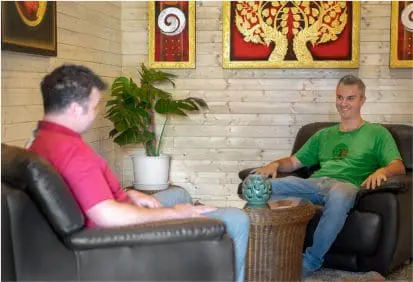How Our Rehab Works
Understanding our Rehab Process
Our Mission
At Jintara Rehab, our mission is to provide high quality and effective treatment at an affordable price.

Your Journey Starts Before You Arrive
You will have a consultation session with one of our therapists before you arrive, so that we learn about your needs and start to plan your treatment.

Arrival
If you need detox medication, we will take you to our psychiatrist on the day you arrive. You will receive medication the same day, which will greatly reduce the discomfort of withdrawal.
The day after you arrive, we will take you for a full medical check-up. Chiang Mai boasts world class hospitals and you will be surprised by the efficiency and thoroughness of the check-up.

Group Sessions
Every morning we hold group sessions which facilitate gaining a deep understanding of the causes and consequences of addiction, as well as how to escape it and – most importantly – to build a new life which is fulfilling and sustainable.
The sessions include psychoeducation, experiential learning and workshops, and skills training, drawing from best practice in addiction treatment.

Individual Counselling
You will meet with your counsellor at least twice a week to progress through your personal journey to freedom from addiction. Extra sessions can be added if needed.
You will work through the aspects of your life which kept you in addiction and develop a vision of your new life. We will help you develop a solid recovery plan detailing how you will achieve this.
The treatment goals of individual counselling are based on your individual needs and priorities. We also offer a variety of therapeutic approaches including Cognitive Behavioural Therapy, Dialectical Behavioural Therapy, Solution-Focused Brief Therapy, Motivational Interviewing, Cognitive Processing therapy, EMDR etc.

Experiencing Life Free From Addiction
Our program allows you to experience for yourself how good life can be without addiction. In the afternoons and weekends, we include a wide variety of supportive and enjoyable elements, such as massage, exercise with a personal trainer, reiki, meditation, good food, and exciting excursions.
By the time you are ready to leave, you know from your own experience how good life can be without addiction.

Treatment Programs
Our basic 4-week program focuses on building up your mental,
Our basic 4-week program focuses on building up your mental, emotional and physical resilience, helping you sever your dependance on substances, and providing you with the tools to continue recovery once you get home.



Our 8-week program allows deeper work on conditions such as anxiety,
Our 8-12 week programs allows deeper work on conditions such as anxiety.
Depression and trauma
For many people, addiction serves to self-medicate feelings of fear, anger, hopelessness or despair. Fortunately, there are better options available, and you will learn and master these. Eight weeks at Jintara will give you a solid foundation of good habits and skills to return home with. Generally, this is the length that we recommend. Our average length of stay is 6-8 weeks.
Sometimes, with deeply entrenched addiction, or with more extensive trauma, a third month is helpful to work through and resolve all issues between you and the life you want. You can discuss your needs with your therapist so that you can make the best choice.
Have any question?
Please complete this email form and we will get back to you immediately.
